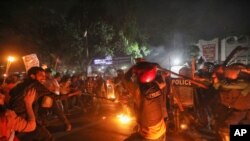Hundreds of people in Bangladesh took part Saturday in a second day of demonstrations sparked by the death of a writer at a high-security prison in a case that has drawn international concern.
Protesters marched at the University of Dhaka chanting slogans condemning the government's treatment of Mushtaq Ahmed as well as other dissident writers, journalists and activists.
Another protest was staged at the National Press Club.
Demonstrators demanded the scrapping of Bangladesh's hardline Digital Security Act (DSA) under which Ahmed was imprisoned. The law has been used to crack down on dissent since it was enacted in 2018.
Security forces clashed with students in Dhaka on Friday night. Police said six people were arrested while activists said at least 30 were injured.
Ahmed collapsed and died at Kashimpur High Security Prison late Thursday. He was first detained in May after criticizing on Facebook the government's handling of the coronavirus pandemic.
The 53-year-old, a crocodile farmer and a writer known for his satirical style, was charged with spreading rumors and conducting "anti-state activities."
Protesters have called his death a "custodial murder" after he was denied bail six times in 10 months.
"Mushtaq Ahmed's death was not a normal death. We'll say it was a murder," said Manisha Chakraborty, a protester with a left-wing group.
Demonstrators said they would march to the office of Prime Minister Sheikh Hasina carrying a coffin later Saturday.
Facing international questions on the case, authorities have ordered a probe into Ahmed's death, senior government official S.M. Tarikul Islam told AFP.
"We formed a committee to probe whether there was negligence by jail officials or procedures in his treatment," Islam said.
Thirteen ambassadors from countries including the United States, France, Britain, Canada and Germany have expressed "grave concern."
"We call on the government of Bangladesh to conduct a swift, transparent and independent inquiry into the full circumstances of Mr. Mushtaq Ahmed's death," the ambassadors said in a statement released late Friday.
They said their countries would be following up over "wider concerns about the provisions and implementation of the DSA, as well as questions about its compatibility with Bangladesh's obligations under international human rights laws and standards."
Rights groups have also raised concerns about the case.
The New York-based Committee to Protect Journalists (CPJ) called for "a swift, transparent and independent investigation", while PEN America said authorities should drop charges against Kabir Kishore, a cartoonist who was detained along with Ahmed.
The CPJ said Kishore passed a note to his brother during a hearing this week stating that he had been subjected to severe physical abuse in police custody.








